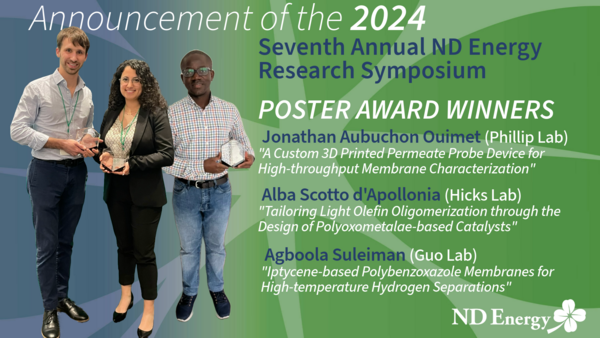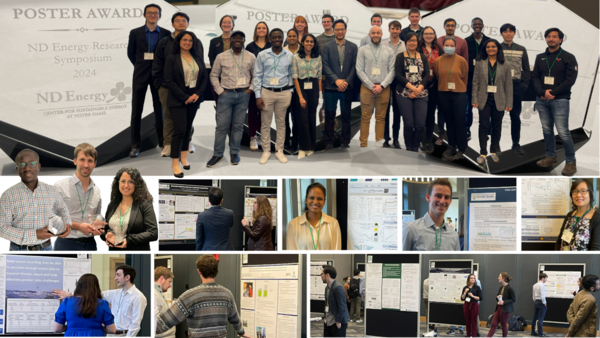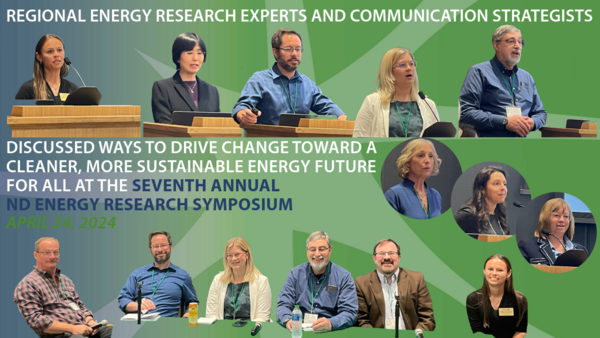
The Center for Sustainable Energy (ND Energy) at the University of Notre Dame hosted its seventh annual research symposium on Wed., April 24, 2024. The theme was driving change through strategic communications and translational research in sustainable energy. Over 60 members of the Notre Dame community attended, including graduate students, undergraduate students, postdoctoral researchers, faculty, and staff from STEM areas across campus.
The morning poster session showcased energy-related research projects from across a broad range of interdisciplinary topics by graduate and undergraduate students and postdoctoral researchers who also competed for the top three poster awards. Out of 28 presenters, the following three graduate students from the Department of Chemical and Biomolecular Engineering won awards for their exceptional research explanation and delivery and aesthetically effective posters.
- Jonathan Aubuchon Ouimet (Phillip Lab), "A Custom 3D Printed Permeate Probe Device for High-throughput Membrane Characterization"
- Alba Scotto d’Apollonia (Hicks Lab), "Tailoring Light Olefin Oligomerization through the Design of Polyoxometalate-Based Catalysts"
- Agboola Suleiman (Guo Lab), "Iptycene-based Polybenzoxazole Membranes for High-temperature Hydrogen Separations"

The afternoon session focused on the theme of communication strategies and translational research to drive change with leaders from regional energy institutes providing brief overviews of their research centers. Ginger E. Sigmon, managing director of ND Energy, kicked off the discussion with an update on major research areas in energy at Notre Dame and the many ways in which ND Energy engages students, faculty, and the general community in education and outreach programs, including the energy studies minor, pre-college programs, experiential learning, research fellowships, career development, and workshops and symposia.
Liping Guo, professor and faculty associate of the Institute for the Study of Environment, Sustainability and Energy (ISESE) at Northern Illinois University (NIU), gave an overview of their institute’s primary goals, including external visibility, environmental studies, and research development. Major research initiatives include water security and quality, ecosystem integrity, smart horticulture, and local government sustainable infrastructure, using a holistic approach to address environmental problems.
Jeff Henderson, associate director of marketing, communications, and education for the Paula M. Trienens Institute for Sustainability and Energy (TISE) at Northwestern University, described the institute’s focus as driving collaborations for discovery, speed, and scale with a strong emphasis on global transformation, translation, and interdisciplinary research and education. Their research expertise includes decarbonization, plastic ecosystem, and public health. Education programs include an undergraduate certificate program and a master’s degree in energy and sustainability.

Ken Anderson, professor of geology, director of the Advanced Energy Institute (AEI), and faculty associate of the School of Earth Systems and Sustainability at Southern Illinois University (SIU), discussed the challenges and opportunities associated with the energy transition and refocusing their research after more than 50 years in coal mining to a diversified research portfolio, including agri-pholtaics, extraction of rare Earth elements, and waste biomass conversion to a water soluble substance. The School of Earth Systems and Sustainability offers both undergraduate and graduate degrees, including several minors.
Kira Edwards, program manager for the Institute for Energy Solutions (IES) at the University of Michigan, highlighted the primary areas of expertise in grid and power systems, buildings, batteries and storage, energy justice, methane emission reduction, renewable integration, and CO2 capture, storage, and use.
The topic then shifted toward strategic communications with remarks by leadership at Notre Dame. Beth Grisoli, assistant vice president of strategic communications in the Office of Public Affairs and Communications, discussed the importance of knowing your audience, highlighting results from a recent Association of American Universities (AAU) general public survey. For instance, the survey showed that by using terms such as “renewable energy”, “solar”, “nuclear”, “sustainable and clean energy” instead of “climate change” to describe energy-related research, this resonates much better with the general public.
Jill Pentimonti, executive director of research advancement in the Office of Federal and Washington Relations, discussed the many ways her office advocates for faculty, students, and leadership on Capitol Hill. By understanding the trends and priorities on the Hill and throughout the various federal agencies, Pentimonti informs the University of the most important topics and where researchers should be spending their time. Pentimonti also disseminates research findings and reports to policymakers and thought leaders and engages the Washington, D.C. community in scholarly activities.
Susan Ryan, executive director of media relations for Notre Dame News, defined the ABC’s of media, stating that first and foremost, faculty, students, and staff have to be “Available” when the news breaks. Subject experts should also be prepared to provide “Background” information for stories, and interviewees should be “Concise” in their remarks, having three key messages prepared along with knowing the facts and data. Ryan then shared tips for “bridging” or steering the interview back to the three key messages when necessary by simply saying, “What I’d really like to focus on …” or “There may be some minor issues, but I’d really like to talk about …”. It is also important to have a properly prepared office space for interviews and to declutter, depersonalize, and customize with logos.
The symposium concluded with a keynote panel discussion, moderated by Peter C. Burns, the Henry J. Massman Professor of Civil and Environmental Engineering and Earth Sciences and director of ND Energy, that brought together the expertise of the regional energy institutes and the audience to explore questions surrounding communication strategies, policy initiatives, and global and community engagements.
Contact:
Barbara Villarosa, Business and Communications Program Director for ND Energy, villarosa.2@nd.edu.